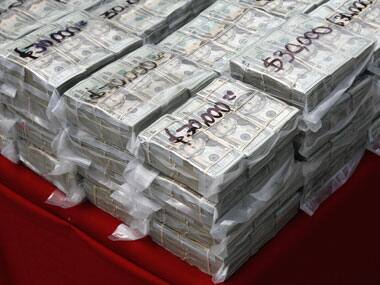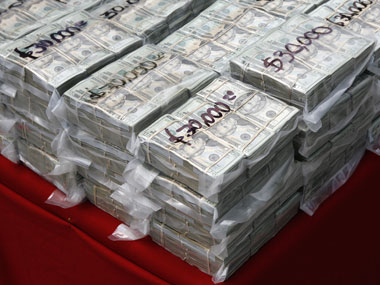Do you hear a fluttering noise? It’s the sound of money that’s flying away from India, and by some estimates, as much as $128 billion in “illicit financial flows” left India in the decade from 2000 to 2009.
That’s the finding of Global Financial Integrity, an agency which works to promote policies that curtail the cross-border flow of illegal money. ( Full report here .)
Illicit capital outflows may, in the estimation of GFI, come about as a result of crime, corruption, tax evasion and other illicit activity.
[caption id=“attachment_165318” align=“alignleft” width=“380” caption=“The entire universe of developing countries lost $8.4 trillion to illicit outflows during the decade. AFP”]
 [/caption]
[/caption]
The entire universe of developing countries lost $8.4 trillion to illicit outflows during the decade. In 2009 alone, they lost $903 billion, down marginally from $1.44 trillion they lost in 2008, largely owing to the financial crisis that wracked the global economy in late 2008.
China was far and away the worst to experience illicit financial flows, losing an estimated $2.7 trillion in the decade from 2000 to 2009. Russia was next in line, a long way behind, with $504 billion in illicit flows. India doesn’t find a place in the top 10,but comes in at No. 15 on the list of developing countries that see the largest illicit financial flows.
Asia accounted for 44.9 percent of total illicit flows from the developing world followed by the Middle East and North Africa (18.6 percent), developing Europe (16.7 percent), Western Hemisphere (15.3 percent), and Africa (4.5 percent).
Impact Shorts
More ShortsBy conservative estimates, illicit flows increased in current dollar terms by 14.9 percent per annum from the beginning until the end of the decade.
Over the ten-year period, 90 percent, on average, of total illicit flows from Asia were transferred abroad through trade mispricing.
In an interview to Firstpost in October , Raymond Baker, director of Global Financial Integrity, emphasised that India needed to focus on curtailing the outgoing outflow of money - rather than on bringing back the black money that’s abroad.
“It doesn’t do much good to try to bring back the black money when the channel still exists for the ongoing outflow of the black money,” Baker said.
India’s focus should, therefore, be on curtailing the ongoing outflow. Expanding India’s tax base and improving tax collection would have the potential to curtail illicit flows.
“To stem the outflow of illicit money from India you have to curtail trade mispricing which is a widely utilised tax avoidance technique of international businesses. Also require confirmation of beneficial ownership in all banking and securities accounts. When you have done that you can turn your attention to that accumulated stock of black money that is already abroad and put pressure on Swiss and other officials to work with you as they have worked with the US in this connection.”
Baker also noted that there was a risk in focussing only “corrupt money and criminal money” without focussing on commercial tax evasion. “You can’t do that - you can’t leave the doors open for the escape of the tax evading money and expect to close the doors for the corrupt and criminal money. You have to deal with this problem across the board if you are going to be successful.”
India, Baker said, certainly had the negotiating power to shake down Swiss banks in the way that the US is doing. “I certainly think India has the negotiating power. India along with China is a huge developing country that has more clout than it has utilised.”
)